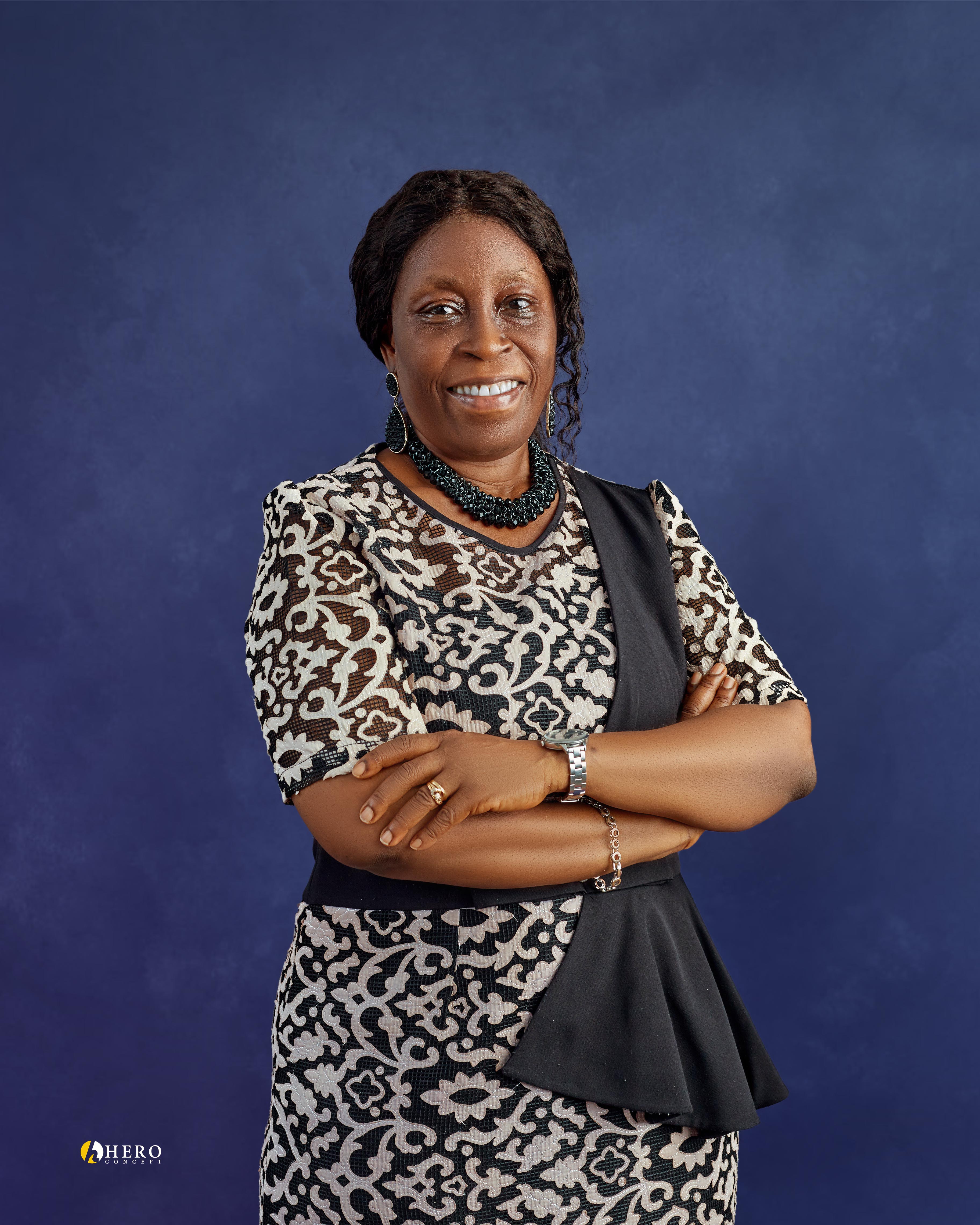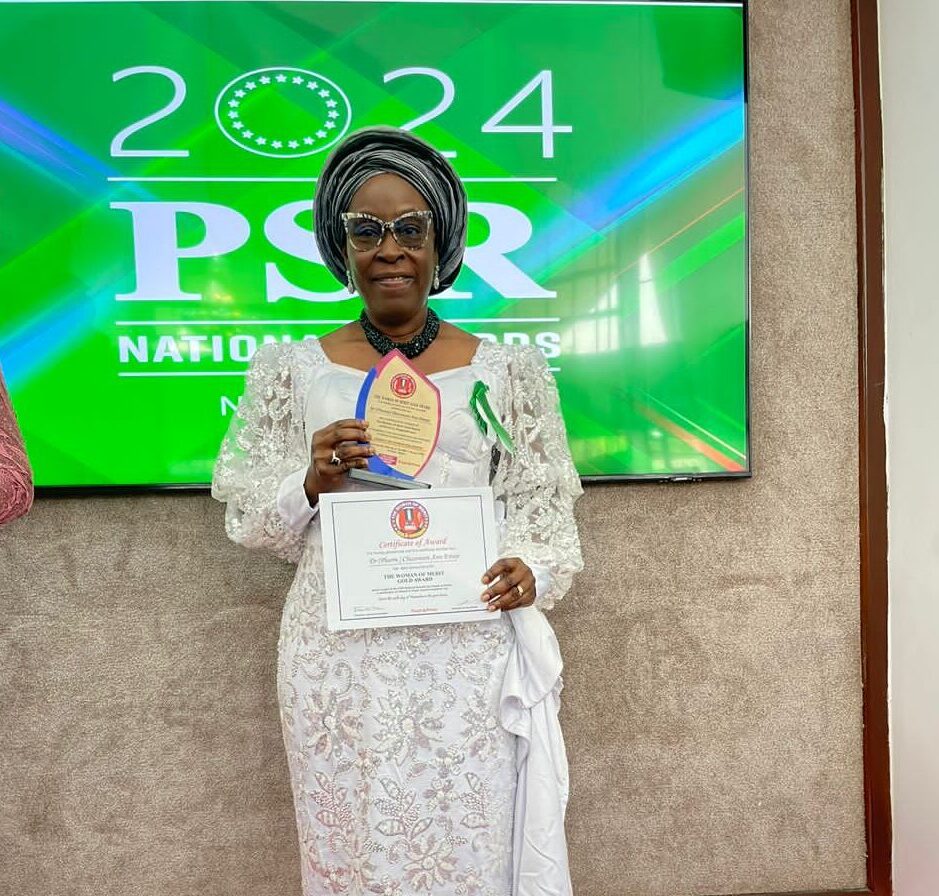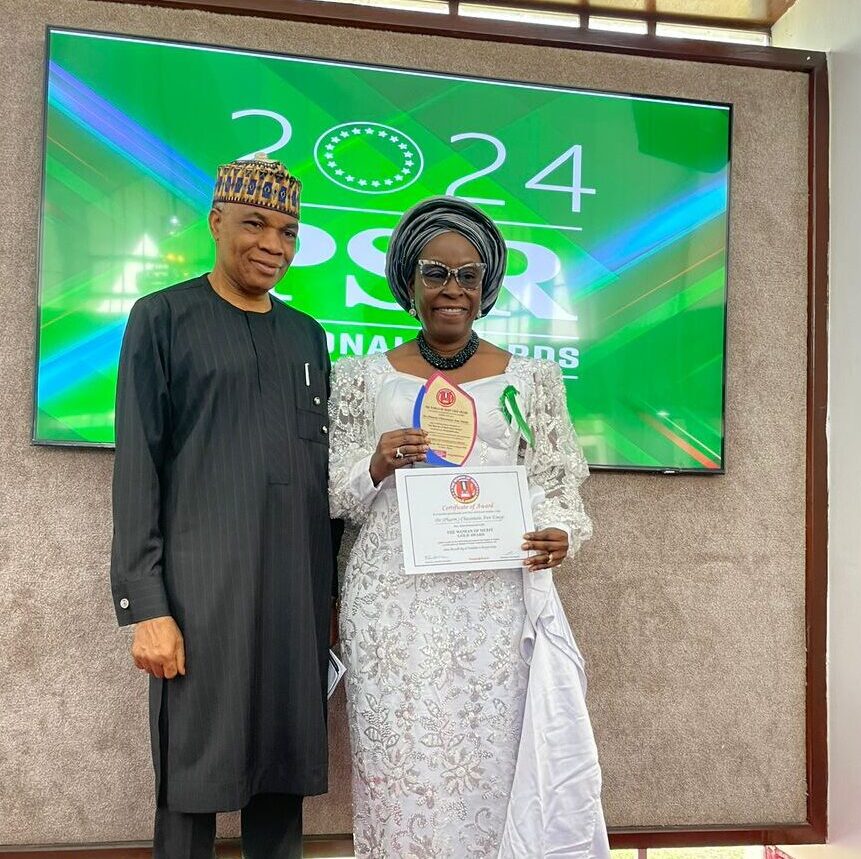 Dr (Pharm.) Chizomam Ann Emeje, the highly resourceful Nigerian pharmacist and Managing Director of Troop Pharmaceuticals is also the first person ever to earn a doctorate degree in Logistics Entrepreneurship. She was recently conferred with the prestigious Woman of Merit Gold Award by People&Power as recognition for her sterling accomplishments.
Dr (Pharm.) Chizomam Ann Emeje, the highly resourceful Nigerian pharmacist and Managing Director of Troop Pharmaceuticals is also the first person ever to earn a doctorate degree in Logistics Entrepreneurship. She was recently conferred with the prestigious Woman of Merit Gold Award by People&Power as recognition for her sterling accomplishments.
The publication recently interviewed her and she tells the candid story of her life, work, challenges and achievements. Excerpts:
You recently won one of Nigeria’s most respected awards and indeed the most highly rated award for women namely the Woman of Merit Gold Award.
How does this make you feel?

I feel grateful to God for the honour. I also feel grateful to People&Power for the recognition.
Many Nigerians who know you would say that you are in the class of most resourceful pharmacists in the country today. What drives your commitment?
Passion, Vision, Mission and Reverence for God. I have great passion for excellence and value always. I keep the vision of Troop Pharmaceuticals alive in me – To be a world class provider of pharmaceuticals.
I work in consonance with the mission of Troop Pharmaceuticals – To provide high quality, efficient, effective pharmaceutical products and services that satisfy the delight of all customers with a committed workforce and professionals of distinction.
I love God and I am passionate about him. Without that reverence and love for him, I personally believe there would be no passion, vision nor mission. These resonate in me so much that even when I am not conscious of it, they have become my personality.
Give us a glimpse into your personal history – your childhood, education and work life.

My childhood was a simple one. I am a product of grace and mercy. At the age of eight, I could not speak English and I was always last in my class. I was in the village as my parents ran from Port Harcourt during war and I was about two years old when that happened. This caused me to start my education in the village. We were taught in Igbo ( as I hail from the Eastern part of Nigeria by birth). My siblings were doing better, having had their foundation in the city.
I hated school with a great passion. I was just last in the class and understood nothing. I only enjoyed myself when we had to go the stream and play in the evening or tell and listen to evening folk tales. What made it worse was the abuse I had as a child from the age of five or six when a maternal cousin (first cousin at that) started living with us. It seemed I was rude to her or did something childishly nasty to her like hitting or slapping so she found her own way to subdue me. She ganged up with some age group of mine and said she had some mystical powers that could do anything for her. That was the beginning of my misery. She made people use my name to sing and dance, made me go and insult people on her behalf and do her bidding at her beck and call. As a child, this continued till I was ten, serving her. I mean I practically served her, did all she wanted. She oppressed me, made me her personal “slave” right under my parents and siblings. No one knew what was going on as she threatened I would die immediately I spoke out. I loved my family and did not want to stop seeing them. Some of my age groups had corroborated her story and I was very sure they were right about her.
I slept in fear and woke up in fear. I was nicknamed her “disciple” in the village by my mother’s friends as they all thought I liked her and adored her but none knew I was suffering in silence. It is a long story with so many uncheering happenings, but that lasted till I was ten, as I said. There was no way I could have done well at school. She was six years older than me and I was forced to be around her always doing her bidding. If my mum called me and she called me, she would insist I answered her first. She had to decide if I would sleep on the same bed with my mum or not. It’s a long story…and I was the last born out of seven children so I could not enjoy that sweetness of a last born.
Hmm. I said I am a product of grace and mercy. Suddenly, after five years of deep misery on my part, she began to cry out that she wanted to take her leave from our house. All pleas from one of my sisters in particular, who did not know what was going on, and pleas from my mother who wanted to help all her sibling’s children, turned on deaf ears. That was God for you. I pretended I wanted her to stay so she would not wield her powers “to kill me”. Thank God she left.
Immediately that happened, I was liberated. The true me which I was not even aware of began to come to the surface. By this time, we were living in Benin – City, Edo State. My father was always on transfer. He was a very dedicated man. Since I was doing very well in school, I was chosen by the top girls’ secondary schools in Benin City in primary six to attend entrance interviews. I was admitted into all of them. I also sat for the unity schools exams. God’s kindness made it possible for me to pass the exams and interviews, having prayed that God would make me pass – at that age of 10/11 years. I was not as smart as my siblings, that was my belief, yet I gained admission to Federal Government Girls Secondary School, Bida. It was a miracle and my family was happy. It was on merit, not what we have now where people buy their children’s admission – very sad. In the secondary school, I was given a Federal Government scholarship on merit being one of the best six students. That was the way it was then. Best six students were given a Federal scholarship till they finished their school.
It was also in the secondary school that I became a real Christian and not just a church goer. Then I realized I had to forgive my cousin and speak to someone about my experiences with her. This became even more important because as she entered the car that took her away that fateful day, she had cautioned me that I would die if I spoke to anyone about my ordeal in her hands.
Still on my childhood and education, I had the best result in my set and came out with aggregate 13, without “expo”, as you have it now. That is almost all As. This was me, the village girl who could not speak English at the age of eight / nine. This is Grace.
I gained admission to University of Ife, now Obafemi Awolowo University, Ile Ife to study Pharmacy and became a pharmacist, which I really love.
Over the years, I focused on family, career and helping every one in my family attain their pursuit. My husband saw I wanted to do more and encouraged me to pursue my studies still. When I saw the opportunity with Ballsbridge University, Commonwealth of Dominica, West Indies, I enrolled for my Masters degree in Logistics and Supply Chain after which I continued to pursue my PhD in Logistics Entrepreneurship. This was obtained last year, 2023. My viva was done when I was in London and my grand daughter was born. I dedicated the thesis to her to record in her mind years to come and in the hearts of all career women that there is nothing you cannot achieve, age not withstanding, as long as you set your heart to it.
Why did pharmacy become the choice career for you?
I like this question. Years ago before I was born, I was told my parents lost one of the twin baby girls they had to the carelessness or rather wickedness of a nurse who did not follow the doctor’s prescription of drug / injection administration. The nurse even slapped my mum in the process as she tried to appeal to her to do the right thing. The twin girls were the first girls in the family and to my grandparents who had all seven boys, my father being the first son and child. You can imagine the trauma this caused everyone.
Pa Michael Ekechukwu, who was a very intelligent man went and bought different health books and became his own doctor. Laugh but that was how he raised us having sworn he would not visit or depend on the hospitals again with his children. That was in the 1950’s. Growing up, our shelves had a lot of health books. I took interest in reading health related items although some things scared me as I read them. Laugh.
When it was getting to time of choice career, one of my elder brothers seeing my dilemma suggested I considered pharmacy since I had interest in health issues but did not like medicine as I could not stand the sight of blood. I was very good too in calculations and chemistry. That was it.
Also, my father always consulted with a pharmacist who ran a pharmacy called “Family Chemist”, in Benin. I admired his profession and how he related to his patients. Even as a child, I saw that.
Summarily, I love a profession that would bring me close to patients without seeing much blood. Our guidance teacher in secondary school tried to change my decision to study medicine. He felt it was a waste of time, “brains”, as he put it, to study pharmacy. He clearly rated pharmacy below medicine but he was very wrong. Pharmacy’s cut off mark into Ife was even higher than that of medicine and then, it was my choice. I liked it, I had prayed and I was determined. That is it.
As Managing Director of Troop Pharmaceuticals, your company has achieved significant milestones in the manufacturing of essential drugs. Share this success story with our readers.

Troop Pharmaceuticals is first and foremost a community pharmacy practice but after some years, we diversified into contract manufacturing. My Chairman, Distinguished Professor Simon Emeje who is also my husband has the philosophy of getting to the peak of everything you do. We saw it was right to add this to the services and we did that. We do not own a manufacturing company but have outsourced that to those who are in the manufacturing sector. This helps us to efficiently concentrate on our patients’ care. We started with just one variant, but later added a second variant of the Vitamin C. We also registered paracetamol, folic acid and Troopzin anti malarial tablets but considering the strength of each, we decided to focus on Troop-C which we consider a necessity for each person. Covid–19 proved us right.
What have the challenges been and how have you surmounted them?
 The main challenge I have encountered is that which is common – human management. Wherever man is placed, there will be issues. The tablets are predictable but not man. People are not sincere. Loyal staff are like 0.01percent. We have gone through this by being relentless. Teaching, training and retraining, carrying bags of forgiveness while maintaining high level of discipline in our practice.
The main challenge I have encountered is that which is common – human management. Wherever man is placed, there will be issues. The tablets are predictable but not man. People are not sincere. Loyal staff are like 0.01percent. We have gone through this by being relentless. Teaching, training and retraining, carrying bags of forgiveness while maintaining high level of discipline in our practice.
It is compounded by worrisome decadence in the legal system as well as high level of corruption in the law enforcement system. If we had such things in place, the average man would understand there are consequences when you abruptly stop work. In our system, even parents and family members will encourage their wards to throw caution to the wind and be insincere. The desire to be rich and “make it” at all cost has eroded the passion to learn. I graduated in 1985 but started the pharmacy after 12 years. God took me through processes but now the younger ones want to be born today and run today. Sad.
The government has not helped much. Pharmacy practice is harsh as cost of energy continues to skyrocket. We spend a lot on fuel as the main source of energy has to be generated by the companies. Though we have solar power now, we still depend on the PHCN. I believe more has to be done here for the medical sector.
You have been an advocate for telemedicine in community pharmacies in Nigeria. How do you see telemedicine gaining a foothold particularly in the rural parts of the country?
Yes, when we started talking of telemedicine, some of my colleagues criticized it thinking we were taking the job of the doctors. Some insisted on the need for physical presence in our practice, but we saw ahead that things are changing. Troop has been blessed with pace setting. We are original and it was a promise God gave us as we wanted to start years back that He would give us insight and we would not need to copy.
In the villages, many have handsets and once you can use your handset to speak with your children overseas, telemedicine is possible. More awareness however needs to be created. During Covid 19 pandemic a very close family member of mine who was on oxygen was managed successfully at home by a doctor in USA and another one in Lagos. Only the nurse was around to monitor the urine output and take other vitals. It was a near death experience but with telemedicine and God on our side, he was managed successfully. If this could happen with such a terrible case, how much more with simpler cases? It will reduce cost of management and pressure on both patients and practitioners.
Your campaign against malaria and your promotion of the use of mosquito bed nets was strong. How do you assess its impact on Nigerians?
It has been good and I am happy that the resentment towards insecticide treated nets has reduced drastically. Before, people would laugh at you when you suggested it. Now, almost everyone knows about it but the issue may now be the heat or what they consider as disfiguring the beauty of the room which really does not have to be so if done well. There is remarkable improvement but we need more as it remains the best way to avoid malaria and high mortality rate both in children and pregnant women especially.
Pharmacy aside, you have earned multiple degrees in other spheres like Logistics Entrepreneurship where you are the first person in the world to earn a PhD in the field. What successes have you recorded in Logistics business?
As you know, I am also the vice chairman of Courier and Logistics Management Institute where we offer capacity building, consultancy and professional membership in these four cardinal areas of Courier, Logistics, Transport and Management. Everything we do in life will involve all or most of these, including leaving your bed to go to the convenience. You will spend time there and have to be careful that your time there does not affect other things you are doing. There is management in all we do. Bringing these to the pharmaceutical sector is my passion too – to make my colleagues see the importance of being professional in logistics, creating and allocating budgets for this sector so you do not just do things any how, incure costs monetarily and time – wise without knowing it. The importance of Logistics in entrepreneurial arena cannot be over emphasized. It makes you different in all you do.
Without doubt, anyone would say you are the ideal woman who works hard to achieve success. Are there other factors you consider as having played a role in the successes you have recorded in life?
Yes indeed. The foundation of faith in God, hard work, transparency and honesty which our parents laid is so rewarding. My mother’s slogan which has been passed to my grandchildren is: “If at first you don’t succeed, try, try, try again.” This means there is no short cut to success, but hard work and patience. Don’t give up.
I am also blessed to have a very supportive husband who is so dedicated to making both me and all our children achieve the best quality of education, reach our peak and serve God. He continued with me where my father stopped. Prof. Simon Emeje is a blessing to me. I have children too who from younger days kept giving me both moral support and assistance in every way they could. Up till now, they do. They are all today directors in Troop Pharmaceuticals and their inputs and various supports are immense.
I am blessed with sincere friends who uphold me and pray for me even when I am not aware. These are, I believe, the reasons I have come this far and still moving because there are more grounds to cover and lands to possess.
What are those areas in your endeavours where you think you probably could have done better?
In human management, I believe. Most pharmacists and doctors are not good managers. We are great in calculations and one plus one is two, but those blessed with behavioral studies will tell you one plus one cannot be two always especially when you are dealing with the specie called Man. I have learned and I am still learning. The way I handle things today, I believe is better but I am still growing.
How would you advice the younger generation of Nigerians who may want to be where you are today?
They need be more patient. For those who are Nigerians, they need to believe in Nigeria or wherever they are, as approved by God, not circumstantially moved to. They need to know there is no short cut to success but integrity and honesty. You may see people comfortable without knowing their stories. The younger ones should also desist from looking at empty-headed people who flaunt ill-gotten wealth. The entertainment industry and media should promote things that showcase the rewards of integrity which is what People and Power is doing.

Fela Anikulapo Kuti Wins Grammy Lifetime Achievement Award
PHOTO SPLASH: 2025 PSR NATIONAL AWARDS (THE NIGERIAN ACHIEVEMENT AWARDS AND THE WOMAN OF MERIT GOLD AWARDS BY PEOPLE & POWER)
Armed Forces Report Major Gains In November, Rescue 318 Kidnap Victims
PDP Issues Expulsion Certificates To Wike, Fayose, 9 Others In Major Party Purge